Rob Bignell's Blog, page 382
February 4, 2013
'7 Minutes a Day...' titles hit top 7 in Kindle sales
All three 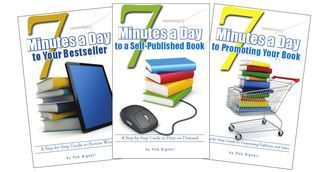 titles in my new 7 Minutes a Day… writing guidebook series hit the top 10 in Kindle sales during the past two weekends. On Saturday, 7 Minutes a Day to Promoting Your Book reached No. 1 in writing reference books, where it stayed through most of Sunday, and was No. 29 overall in reference books. The previous weekend, 7 Minutes a Day to a Self-Published Book topped out at No. 3 in sales in writing reference books and No. 41 overall for reference books while 7 Minutes a Day to Your Bestseller hit No. 7 for writing reference books and No. 48 overall for reference books. Thanks to all who purchased copies! They’re still available on Kindle ebook and in traditional paper books as well!
titles in my new 7 Minutes a Day… writing guidebook series hit the top 10 in Kindle sales during the past two weekends. On Saturday, 7 Minutes a Day to Promoting Your Book reached No. 1 in writing reference books, where it stayed through most of Sunday, and was No. 29 overall in reference books. The previous weekend, 7 Minutes a Day to a Self-Published Book topped out at No. 3 in sales in writing reference books and No. 41 overall for reference books while 7 Minutes a Day to Your Bestseller hit No. 7 for writing reference books and No. 48 overall for reference books. Thanks to all who purchased copies! They’re still available on Kindle ebook and in traditional paper books as well!
Need an editor? Having your book, business document or academic paper proofread or edited before submitting it can prove invaluable. In an economic climate where you face heavy competition, your writing needs a second eye to give you the edge. I can provide that second eye.
Related articles
 Editor's '7 Minutes a Day...' writing guides on sale
Editor's '7 Minutes a Day...' writing guides on sale '7 Minutes a Day' now available in paperback!
'7 Minutes a Day' now available in paperback! Editor's marketing book garners positive reviews
Editor's marketing book garners positive reviews Self-publishing book receives good reviews
Self-publishing book receives good reviews Deming, N.M. newspaper features '7 Minutes'
Deming, N.M. newspaper features '7 Minutes'
Editing client’s sales motivation book published
Dynast Amir,  an editing client of mine this winter, has released his first book, “Get Off You Ass and Cold Call!!!” The self-help/sales motivation book serves as a reminder to not only sales professionals but to people in all walks of life, that to accomplish everything your heart desires, one must pay a price. This “price,” simply stated, is hard work. Amir was an American Family Insurance ALL-USA first team running back from California in 1999 and signed with Georgia. He’s now in sales in the Los Angeles area. Amir’s book is available at Amazon.com.
an editing client of mine this winter, has released his first book, “Get Off You Ass and Cold Call!!!” The self-help/sales motivation book serves as a reminder to not only sales professionals but to people in all walks of life, that to accomplish everything your heart desires, one must pay a price. This “price,” simply stated, is hard work. Amir was an American Family Insurance ALL-USA first team running back from California in 1999 and signed with Georgia. He’s now in sales in the Los Angeles area. Amir’s book is available at Amazon.com.
Need an editor? Having your book, business document or academic paper proofread or edited before submitting it can prove invaluable. In an economic climate where you face heavy competition, your writing needs a second eye to give you the edge. I can provide that second eye.
Related articles
 Editing client releases first novel in four-part saga
Editing client releases first novel in four-part saga Editing client releases 'Twin Identity'
Editing client releases 'Twin Identity' Editing client from Texas releases his debut novel
Editing client from Texas releases his debut novel Editing client releases first book, 'Made This Way'
Editing client releases first book, 'Made This Way' '7 Minutes a Day' titles make Kindle Top 10 list
'7 Minutes a Day' titles make Kindle Top 10 list
February 3, 2013
Goodreads reviewer lauds my poetry collection
Love Letters to Sophie’s Mom 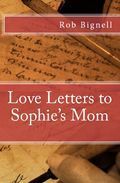 recently received a positive review on Goodreads. Of the love poems, reader Kyle John Janison wrote, “A number of qualities set this book apart from other poetry collections. ... This is no run-of-the-mill collection and one you’ll certainly enjoy.” The collection traces a relationship from the first dance of love at a coffee shop to its tragic demise as mental illness overtakes the narrator’s beloved. Inspired by a diverse array of writings, including the verse of Pablo Neruda, Dylan Thomas, and Bob Dylan, the collection’s 34 poems touch upon themes including nature, Southern California, and the Northwoods. Love Letters to Sophie’s Mom is available in paperback and Kindle; and just in time for Valentine’s Day, soon on Nook, iBook and other eReaders.
recently received a positive review on Goodreads. Of the love poems, reader Kyle John Janison wrote, “A number of qualities set this book apart from other poetry collections. ... This is no run-of-the-mill collection and one you’ll certainly enjoy.” The collection traces a relationship from the first dance of love at a coffee shop to its tragic demise as mental illness overtakes the narrator’s beloved. Inspired by a diverse array of writings, including the verse of Pablo Neruda, Dylan Thomas, and Bob Dylan, the collection’s 34 poems touch upon themes including nature, Southern California, and the Northwoods. Love Letters to Sophie’s Mom is available in paperback and Kindle; and just in time for Valentine’s Day, soon on Nook, iBook and other eReaders.
Need an editor? Having your book, business document or academic paper proofread or edited before submitting it can prove invaluable. In an economic climate where you face heavy competition, your writing needs a second eye to give you the edge. I can provide that second eye.
Related articles
 Editor's poetry collection now on Kindle
Editor's poetry collection now on Kindle WPR interview with editor now available
WPR interview with editor now available Editor's books now on sale at Minneapolis store
Editor's books now on sale at Minneapolis store My poetry book now on Nook, other e-readers
My poetry book now on Nook, other e-readers Amazon.com reviewer lauds my poetry collection
Amazon.com reviewer lauds my poetry collection
February 2, 2013
Volume One features ‘7 Minutes a Day...’ series
Volume One,  the premier guide to arts and entertainment in the Chippewa Valley, ran an article in its latest edition about my new 7 Minutes a Day… writing guidebooks. The biweekly newspaper quoted me as saying, “The challenge of self-publishing is that writers have to do almost everything that a big publishing house would otherwise do for them – editing, designing a cover, formatting the book, handling the printing and distribution, sending out press releases and more.” The 7 Minutes a Day series, which helps writers navigate through those obstacles, is available in paperback or ebook.
the premier guide to arts and entertainment in the Chippewa Valley, ran an article in its latest edition about my new 7 Minutes a Day… writing guidebooks. The biweekly newspaper quoted me as saying, “The challenge of self-publishing is that writers have to do almost everything that a big publishing house would otherwise do for them – editing, designing a cover, formatting the book, handling the printing and distribution, sending out press releases and more.” The 7 Minutes a Day series, which helps writers navigate through those obstacles, is available in paperback or ebook.
Need an editor? Having your book, business document or academic paper proofread or edited before submitting it can prove invaluable. In an economic climate where you face heavy competition, your writing needs a second eye to give you the edge. I can provide that second eye.
Related articles
 Editor's '7 Minutes a Day...' writing guides on sale
Editor's '7 Minutes a Day...' writing guides on sale '7 Minutes a Day' titles make Kindle Top 10 list
'7 Minutes a Day' titles make Kindle Top 10 list Self-publishing book receives good reviews
Self-publishing book receives good reviews Editor's marketing book garners positive reviews
Editor's marketing book garners positive reviews Deming, N.M. newspaper features '7 Minutes'
Deming, N.M. newspaper features '7 Minutes'
February 1, 2013
‘7 Minutes a Day’ now available in paperback!
The three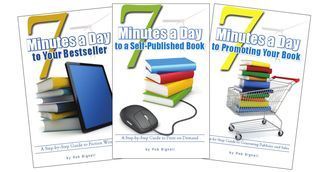 titles in my new 7 Minutes a Day… writing guidebooks are now available in paperback! The series offers step-by-step guides to writing, self-publishing and marketing your book. Simply set aside seven minutes a day – between classes, in the morning before your family gets up, or during lunch at work.
titles in my new 7 Minutes a Day… writing guidebooks are now available in paperback! The series offers step-by-step guides to writing, self-publishing and marketing your book. Simply set aside seven minutes a day – between classes, in the morning before your family gets up, or during lunch at work.
Books in the series include:
n 7 Minutes a Day to Your Bestseller – Novel writers receive expert advice on topics like motivating yourself to write, starting your story with exciting opening lines, creating intriguing characters, mastering the craft of writing to elevate your style, and pitching your story to potential publishers.
n 7 Minutes a Day to a Self-Published Book – Whether writing a novel or nonfiction, whether planning to print a paperback or an ebook, this book guides you through the self-publishing process, from the title page to the index, from designing a cover to formatting your text.
n 7 Minutes a Day to Promoting Your Book – You’ll develop a strategy that will get articles about your self-published book in newspapers, magazines, on radio and television programs, posted on blogs and linked to on websites, while landing you book signings and readings, all at virtually no cost.
The paperbacks (and ebooks) currently are available at Amazon.com.
Need an editor? Having your book, business document or academic paper proofread or edited before submitting it can prove invaluable. In an economic climate where you face heavy competition, your writing needs a second eye to give you the edge. I can provide that second eye.
Related articles
 Editor's '7 Minutes a Day...' writing guides on sale
Editor's '7 Minutes a Day...' writing guides on sale Self-publishing book receives good reviews
Self-publishing book receives good reviews Deming, N.M. newspaper features '7 Minutes'
Deming, N.M. newspaper features '7 Minutes' '7 Minutes a Day' titles make Kindle Top 10 list
'7 Minutes a Day' titles make Kindle Top 10 list Editor's marketing book garners positive reviews
Editor's marketing book garners positive reviews
January 31, 2013
Deming, N.M. newspaper features '7 Minutes'
The Deming
 (N.M.) Headlight newspaper ran an article about my new 7 Minutes a Day… writing guidebooks on Monday. The three-book series takes writers through the process of penning a novel to self-publishing and then promoting that book. The Headlight quoted me as saying, “Big publishing houses just aren't printing many titles anymore. The result is a lot of great books aren't going to see daylight unless authors take it upon themselves to print their own books. Self-publishing has allowed authors to do just that.” I lived in Deming from 1992-94, where I taught English and journalism at the middle and high schools.
(N.M.) Headlight newspaper ran an article about my new 7 Minutes a Day… writing guidebooks on Monday. The three-book series takes writers through the process of penning a novel to self-publishing and then promoting that book. The Headlight quoted me as saying, “Big publishing houses just aren't printing many titles anymore. The result is a lot of great books aren't going to see daylight unless authors take it upon themselves to print their own books. Self-publishing has allowed authors to do just that.” I lived in Deming from 1992-94, where I taught English and journalism at the middle and high schools.
Need an editor? Having your book, business document or academic paper proofread or edited before submitting it can prove invaluable. In an economic climate where you face heavy competition, your writing needs a second eye to give you the edge. I can provide that second eye.
Related articles
 '7 Minutes a Day' titles make Kindle Top 10 list
'7 Minutes a Day' titles make Kindle Top 10 list Editor's marketing book garners positive reviews
Editor's marketing book garners positive reviews Editor's '7 Minutes a Day...' writing guides on sale
Editor's '7 Minutes a Day...' writing guides on sale
January 30, 2013
Self-publishing book receives good reviews
My new 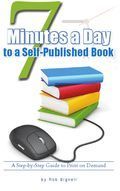 book 7 Minutes a Day to a Self-Published Book has received a number of positive reviews on Amazon.com. Among the comments:
book 7 Minutes a Day to a Self-Published Book has received a number of positive reviews on Amazon.com. Among the comments:
n “Anyone looking to self-publish their book, whether fiction or non-fiction, should definitely have this book on their shelf.” - Vincent Pauletti, published author, Amazon.com review (Jan. 25)
n “This is hands down the best book on the market for anyone who dreams of being self-published.” - David Bignell, published author (Jan. 25)
Whether writing a novel or nonfiction, whether planning to print a paperback or an ebook, 7 Minutes a Day to a Self-Published Book guides you through the self-publishing process, from the title page to the index, from designing a cover to formatting your text.
Need an editor? Having your book, business document or academic paper proofread or edited before submitting it can prove invaluable. In an economic climate where you face heavy competition, your writing needs a second eye to give you the edge. I can provide that second eye.
Related articles
 Editor's marketing book garners positive reviews
Editor's marketing book garners positive reviews Reviewer gives editor's novel positive review
Reviewer gives editor's novel positive review Editor's novel receives another positive review
Editor's novel receives another positive review Why you want reviews written about your book
Why you want reviews written about your book
January 29, 2013
Editor's novel receives another positive review
My 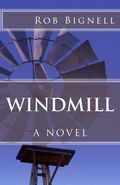 novel Windmill received a positive review on Thursday on Amazon.com. The novel tells the story of Carl Steinar and his sons, Peter and Lyle, who for 15 years have maintained a tenuous balance keeping together their family and farm…but when Abbie Blaire, the new reporter in town, comes to write a story about them, a monkey wrench is thrown into their perfect machine: She is the spitting image of the wife and mother the Steinar men lost years ago. Of the book, a reviewer named Arthur wrote, “I found myself quickly drawn in by the author’s amazing analogies and magnificent metaphors to a story that grabs your interest and does not let go until the last page is turned.” Windmill is available in paperback.
novel Windmill received a positive review on Thursday on Amazon.com. The novel tells the story of Carl Steinar and his sons, Peter and Lyle, who for 15 years have maintained a tenuous balance keeping together their family and farm…but when Abbie Blaire, the new reporter in town, comes to write a story about them, a monkey wrench is thrown into their perfect machine: She is the spitting image of the wife and mother the Steinar men lost years ago. Of the book, a reviewer named Arthur wrote, “I found myself quickly drawn in by the author’s amazing analogies and magnificent metaphors to a story that grabs your interest and does not let go until the last page is turned.” Windmill is available in paperback.
Need an editor? Having your book, business document or academic paper proofread or edited before submitting it can prove invaluable. In an economic climate where you face heavy competition, your writing needs a second eye to give you the edge. I can provide that second eye.
Related articles
 Get a 'look inside' author's debut novel 'Windmill'
Get a 'look inside' author's debut novel 'Windmill' Reviewer gives editor's novel positive review
Reviewer gives editor's novel positive review Menomonie, Wis., newspaper features 'Windmill'
Menomonie, Wis., newspaper features 'Windmill' Volume One hosts 'Windmill' book reading
Volume One hosts 'Windmill' book reading
January 28, 2013
'7 Minutes a Day' titles make Kindle Top 10 list
My 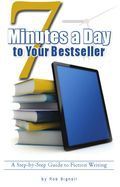
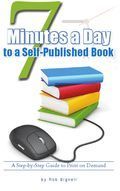 new 7 Minutes a Day… writing guidebook series enjoyed good some sales over the weekend. 7 Minutes a Day to a Self-Published Book reached No. 3 in sales in the Basic guidelines for self-publishing ebooks
new 7 Minutes a Day… writing guidebook series enjoyed good some sales over the weekend. 7 Minutes a Day to a Self-Published Book reached No. 3 in sales in the Basic guidelines for self-publishing ebooks
January 27, 2013
'7 Minutes a Day' series appears on 6 news sites
My
 new 7 Minutes a Day… writing guidebook series garnered some nice early attention from the press. The series was featured Thursday on several Patch news sites: Carlsbad, Del Mar-Carmel Valley, Encinitas, Oceanside and Palm Desert in California and Iowa City in Iowa. I used to live in Encinitas (Carlsbad, Carmel Valley, Del Mar and Oceanside are neighboring communities), Palm Springs (Palm Desert is a neighboring city) and Iowa City. All three books in the 7 Minutes a Day... series can be purchased online.
new 7 Minutes a Day… writing guidebook series garnered some nice early attention from the press. The series was featured Thursday on several Patch news sites: Carlsbad, Del Mar-Carmel Valley, Encinitas, Oceanside and Palm Desert in California and Iowa City in Iowa. I used to live in Encinitas (Carlsbad, Carmel Valley, Del Mar and Oceanside are neighboring communities), Palm Springs (Palm Desert is a neighboring city) and Iowa City. All three books in the 7 Minutes a Day... series can be purchased online.
Need an editor? Having your book, business document or academic paper proofread or edited before submitting it can prove invaluable. In an economic climate where you face heavy competition, your writing needs a second eye to give you the edge. I can provide that second eye.
Related articles
 Editor's 'Hikes: Games' now available on Kindle
Editor's 'Hikes: Games' now available on Kindle Editor's '7 Minutes a Day...' writing guides on sale
Editor's '7 Minutes a Day...' writing guides on sale '7 Minutes a Day' titles make Kindle Top 10 list
'7 Minutes a Day' titles make Kindle Top 10 list



